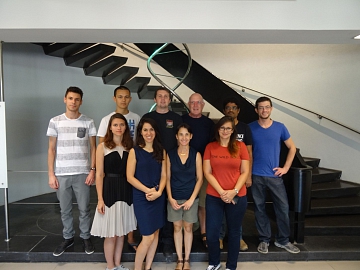Young scientists from the Faculty of Chemistry underwent training in Israel
 Faculty of Chemistry master’s degree students Olga Shaprova and Denis Murashkin have been working at Tel Aviv University (TAU) under the guidance of Professor Johnathan Gershoni for 2 weeks. Students’ scientific supervisor, Assistant Professor of the Department of Organic Chemistry Dmitry N. Sherbakov also took part in their internship.
Faculty of Chemistry master’s degree students Olga Shaprova and Denis Murashkin have been working at Tel Aviv University (TAU) under the guidance of Professor Johnathan Gershoni for 2 weeks. Students’ scientific supervisor, Assistant Professor of the Department of Organic Chemistry Dmitry N. Sherbakov also took part in their internship.
Johnathan Gershoni is a famous scientist in the area of molecular immunology and peptide phage display. His laboratory, which is a part of Cellular Immunology Department, conducts works connected to phage display and next generation sequencing. The students were developing the method for analyzing profiles of blood serum antibodies.
“Research at Tel Aviv University is at a very high level. A number of scientific problems are solved by the university science and students take an active part in academic work. We should create similar system at our university,” said D.N. Sherbakov.
Tel Aviv University is one of the major centers for scientific and research activity in Israel. There are more than 100 research centers, institutes and laboratories at the university. TAU cooperates extensively with the leading foreign academic centers, hosts congresses and conferences of top international scientific associations.
“This internship opened up new horizons for our scientific work. It was interesting to learn about methods used at Tel Aviv University, because different laboratories have different methods. It is a good thing that we can apply this knowledge and experience to our routine. The laboratory’s employees are very team-minded, they supported us in every possible way, gave us recommendations on how to spend our leisure time, where to go, how to get to the tourist attractions and what traditional dishes to taste. Hence the trip turned out wonderful in every respect,” shared impressions Olga Shaprova.
“The trip to Israel was productive and helpful. To adopt the best practices from our Israel colleagues in such short period of time was hard. Another difficulty was a short working day: the laboratory usually closed at 4 p.m. Internship curator, Professor Johnathan Gershoni and laboratory officers taught us how to use Deep Sequencing technology and methods of domain-scan library construction within two weeks. After exchanging experience in work with phage peptide libraries, we enhanced the efficiency of our work process. I have already started using the acquired skills in my work,” said Denis Murashkin.

